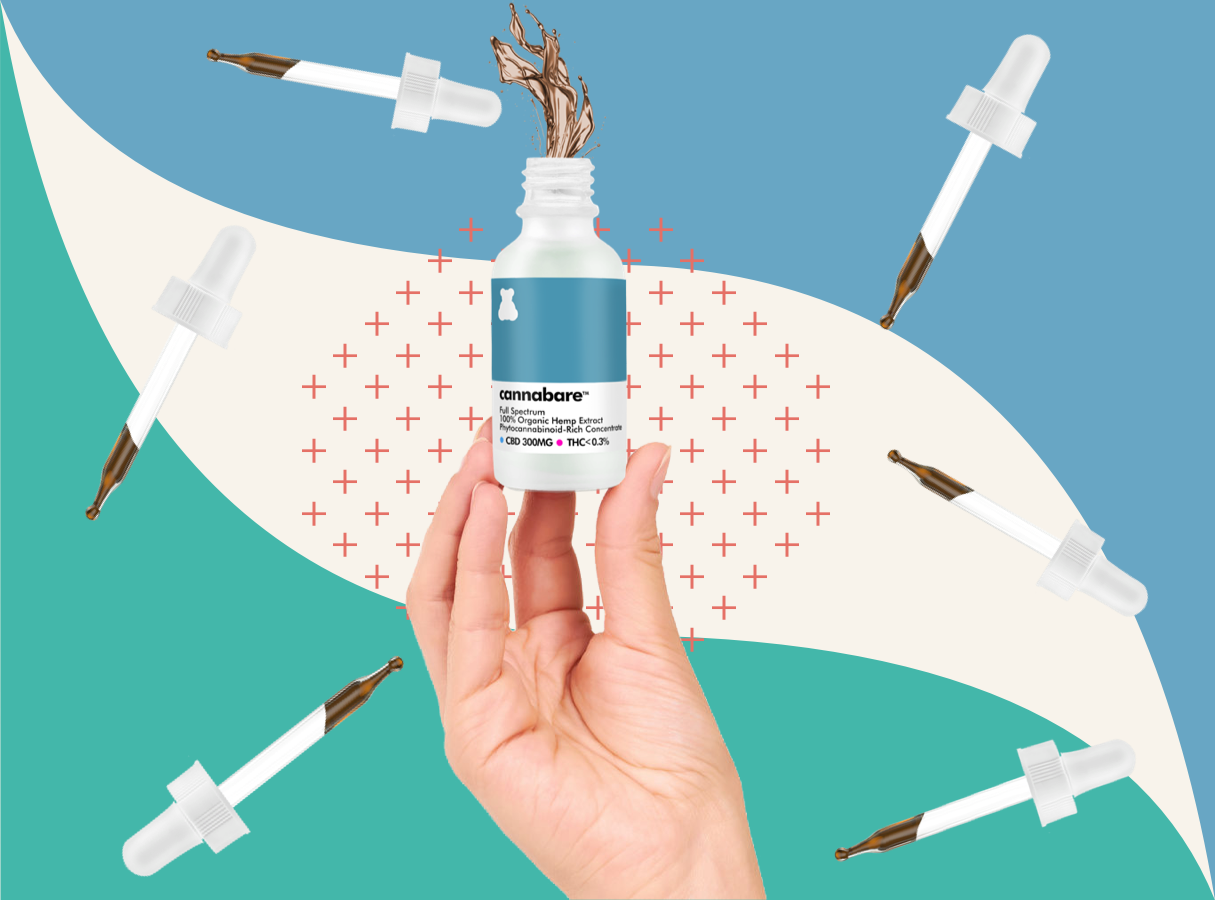What is CBD?
WHAT IS CBD OIL?
CBD, also known as cannabidiol is an essential cannabinoid naturally produced in the stems, leaves, and flowers of the hemp plant. It is the 2nd most rich cannabinoid, although historically it has been relegated in favour of other more famous psychoactive compounds such as THC.
Today, many manufacturers and scientists are discovering the benefits that CBD can offer to our health and well-being. Its potential is unlimited as more consumers are informed about CBD products, so many people wondering:
CBD Oil is made by extracting the compound from hemp (due to it's high CBD profile) It is then extracted by using the CO2 supercritical extraction method. After extraction, the CBD is then diluted within a carrier oil such as hemp seed, coconut, or even MCT to make CBD oil!
How does CBD effect us?
CBD interacts with your body through the endocannabinoid system (ECS). This system looks after your whole body and wants it to reach a general state of balance (homeostasis). It’s made up of chemical compounds and receptors that all act to maintain your mind and body’s balance.
The two receptors we’re referring to within our body’s are called CB1 receptors and CB2 receptors. Cannabinoids like CBD look for and activate cannabinoid receptors and when they get together they tell your body to feel a certain type of way and do certain tasks. They also affect and regulate the way other bodily systems function, like your immune, nervous, and gastrointestinal systems.
CBD Oil Benefits
Although legislative standardization has slowed the popularization of CBD as a therapeutic supplement, scientific research and consumer experiences have uncovered a large number of potential health benefits. Commonly known for its anxiolytic properties, CBD does not produce any of the negative psychological effects associated with psychoactive cannabinoids.
Due to its many healthy properties, CBD oil can be used for very different problems. In addition to studies, many reports from users have proven the positive effects of CBD oil.
- Pain
- Migraine
- Anxiety and panic disorders
- Depression
- Post Traumatic Stress Disorder (PTSD)
- Nausea
- Sleep disorders
- Acne
- Smoking cessation
- Obesity
- Relieving stress and much more.
How CBD oil is extracted?
CBD oil starts as organically grown hemp, always produced with the final users in mind. Once the plants mature, it is ready to harvest and processed. Then, the terpenes, that are therapeutic and aromatic compounds are preserved in the flowers thanks to an exclusive process of steam distillation, followed by the extraction of the CBD with CO2. This process results in purified oils that intentionally maintain the set of cannabinoids and the entire terpene spectrum of the original plants.
Pure Vs. Raw:
CBD oils can be divided into two broad categories: purified and crude. The crude oil is mixed and extracted with vegetable oil but do not undergo any other process. This method obtains slightly uniform oils, which have a dark green color and vary substantially in terms of concentrations.
Pure:
- Filtered and extracted to eliminate lipids, chlorophyll, and unwanted chemicals.
- Natural odor and completely liquid consistency.
- It only contains the ingredients which really matter.
- Light color.
Raw:
- Mixed and extracted with vegetable oils without any added process. This provides different types of oils.
- The quality of the oil concentration varies.
- Dark color.
- The oil is not always decarboxylated.
What does the percentage of CBD oil mean?
Extracted from pressed hemp oil, CBD is a crystal in its purest form. This 100% pure CBD is extremely expensive. In severe illnesses, however, interesting healing effects could already be observed.
The crystalline, pure CBD is mixed in the further processing step with a carrier oil. The percent is simply the amount of CBD contained in the oil.
We recommend the following concentrations:
- Mild to moderate discomfort (headache, difficulty sleeping, nervousness, depression): CBD oil at 5 - 15% concentration.
- Moderate discomfort (severe headache, test anxiety, nerve trembling): CBD oil at 15 - 25% concentration. This is already a very high concentration, which should be discussed with the doctor.
- Severe discomfort: CBD oil over 25% concentration. The strongest currently available CBD oil has a concentration of 48%. This is a real "hammer" that necessarily belongs to the doctor.
Cannabis Oil vs CBD Oil:
CBD oil is derived from hemp plants. In both oils are accordingly the hemp own, herbal ingredients, the so-called cannabinoids. CBD oil has only a comparatively small amount of THC, in difference to oil tagged "cannabis oil".
The content of THC in CBD oil is always below 0.3 %. After that only it is possible to sell legally cannabis oil. CBD oil is made to contain only one of the hemp's own cannabinoids, an active ingredient called cannabidiol.
THC is also a cannabinoid. Unlike cannabidiol, however, THC is thought to have psychoactive or psychotropic effects.
If any product is provided explicitly like cannabis oil, it is because the buyer is allowed to know that the content of THC in the product provided is just above 0.3%.
As synonyms for the name cannabis oil the terms "marijuana oil" or "hash oil" and "THC oil" are usually used. The name "hemp oil" is just like "hemp seed oil" reserved for all those products that are made from hemps seeds which are also called hemp nugs.
Although hemp oil has a large quantity of fatty acids unsaturated like omega-6 and omega-3, it has not or only insignificant CBD or THC traces levels. In few cases, these amount possibly due to the fact that the plant material sticks to the seeds are using during production.
In the CBD oil or cannabis oil production, the hemp oil is frequently used to bring their effect to complete development.
While the term "Hemp Oil" is well-known in the United States and it is used to explain everything that was once, at least proportionally, extracted from a hemp plant, in many other countries, it comes with the name of an oil classifies the generic name "cannabis oil" as an oil that does not meet the similar definition of CBD oil. The abstract distinction thus has to do mostly with the remaining restrictions enforced by the legal requirements.
Cannabis Oil:
The difference in the proportion of THC is then also clear: Cannabis oil is often a share of 50 to 80 percent THC.
All cannabis oils, including the more moderate with the CBD-reduced portion, have proven to be effective in alleviating pain. In particular pain of chronic nature as they occur for example, in connection with rheumatism or osteoarthritis, according to the observations of users, especially with regular use of cannabis oils.
Cannabinoids fight inflammation. Applied to the skin, cannabinoid ointments and oils are effective remedies for acne or psoriasis. Because they are generally mood-enhancing and invigorating, cannabinoids are often used to treat mental health problems associated with depression or anxiety disorders.
In palliative medicine, the use of cannabidiol is already advised. Because cannabinoids reduce stress and relax, they are also used to remedy sleep disorders. Cannabinoids regulate appetite, can relieve constipation and be used against obesity.
Exemplary attention gained in 2003, the Canadian Rick Simpson. He had treated self-made cannabis oil for skin cancer that he had diagnosed and then claimed to have killed the skin cancer with cannabis oil. Afterward, Simpson allegedly successfully treated his mother's psoriasis and the melanoma of a friend with his cannabis oil.
The proportion of THC, the cannabis oil produced by him, was almost 80 percent. Of course, such accounts of almost wondrous healings are to be viewed with skepticism. However, it should also be noted that in the meantime, medical research has itself carried out many series of experiments, yielding results demonstrating the therapeutic efficacy of cannabinoids. Therefore, the experimental zeal of the Canadian must be justified in retrospection to some extent.
In general, it can be said that the effect of cannabis oil is comparable to that of CBD oil, but the effect is to be expected in a significantly increased form.
Add to the dose? - Cannabis oil in use for severe pain:
In some cases, CBD oil is simply not enough to relieve the symptoms. Their symptoms are often so severe that only a combination of CBD and THC can help, especially in asthmatics and allergy sufferers or rheumatic patients sometimes makes the lack of CBD oil little THC just the crucial difference.
Only one agent with the drug combination leads to a significant improvement in the condition. However, as THC falls under the Narcotics Act, seekers often shy away from making a purchase, the funds offered on the Internet, and prefer to seek the help of a doctor.
In many countries, cannabis may be legally used as a medicinal substance. It still requires special permission of the treating physician. And it's not always easy to find a doctor who knows enough and prescribes.
The cannabis oil offered in the pharmacy is called dronabinol. It is also offered in the form of drops. THC-containing capsules containing cannabis oil and taken as tablets are also available from the pharmacy.
Since the medicines are expensive, they quickly make a dent in the physician's budget and are therefore sometimes even reluctantly prescribed.
It is therefore already understandable that interested buyers, most people with a high level of suffering or pain, are increasingly looking around for offers of medicinal cannabis products even outside the pharmacies and on the Internet.




